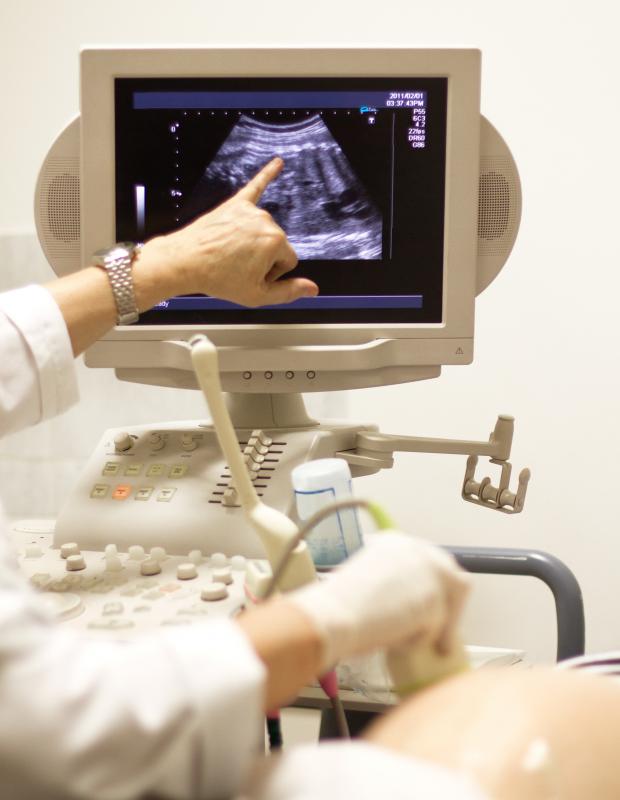At EasyTechJunkie, we're committed to delivering accurate, trustworthy information. Our expert-authored content is rigorously fact-checked and sourced from credible authorities. Discover how we uphold the highest standards in providing you with reliable knowledge.
What is a Doppler Probe?
A Doppler probe is a device most often used in medical applications to measure the shift in sound waves emitted by and bounced back to the device. The probe allows the measurement and either visualization or audio simulation of the movement of substances within the body. Doppler probes are most often used in cardiovascular applications, and for confirming and monitoring pregnancy in both humans and animals.
Generally, a Doppler probe uses the principle of the Doppler effect to assess whether something is moving, and to relay the relative speed of movement. The Doppler effect is the change in frequency of a wave – usually sound waves but also applicable to other types of radiation waves – as the source moves relative to the observer. Each frequency of the wave appears higher when an object is getting closer to the observer and lower when it is moving away.

This understanding of the Doppler effect means that devices can be created to measure the change in frequency of sound waves bouncing off, or being emitted by, a structure. The information on the Doppler probe can be used to assess how fast something is moving and its direction of travel.
Doppler probes are most often used in a medical setting. Their uses include fetal heart monitoring, locating blood vessels before surgery to avoid unintentionally severing them, and monitoring speed and direction of blood flow during cardiovascular surgery. The probes also are used when diagnosing portal hypertension, a disease of the liver where blood flow is reversed through the veins and arteries of the liver.

For fetal heart monitoring, Doppler probes are available for both clinical and home use. Expectant parents use them to experience the sound of a baby's heart beating before birth. 3MH probes are used for detecting a heart rate in early pregnancy, usually at 8-10 weeks gestation, while 2MH probes are used for overweight women who are pregnant. Some fetal heart monitoring Doppler probes are waterproof so that they may be used during underwater births. A popular myth about Doppler probe heart rate monitoring claims that results can be used to predict the sex of a baby; however, this notion is not supported by scientific evidence.
Doppler probes of varying sizes and attachments are often used during surgery. The probe is used to verify that blood is reaching an area of the body. It is also used to locate blood vessels in order to preserve them during the operation.
AS FEATURED ON:
AS FEATURED ON:












Discussion Comments
@Kat919 - It's actually possible to hear it with a stethoscope, though not until later in pregnancy. What a lot of people in the natural childbirth community use is a fetoscope, which is basically a specialized stethoscope that can pick up a heartbeat by about twelve weeks or so.
Some in the natural birth community feel that ultrasound technology is still relatively new and untested. A lot of people don't realize that ACOG (the professional organization of OB/GYNs) actually does not recommend (or advise against) routine ultrasounds. So those women and midwives prefer to skip ultrasounds and Doppler and use the fetoscope instead.
You can actually wind up with surprise twins that way! If one baby is hiding behind the other, the fetoscope might not pick up the heartbeat.
A friend of mine had one of those ultrasound dopplers that you can use at home during your pregnancy. I think she thought it would be reassuring, but it seemed to me like it was actually the opposite. She was always checking the baby's heartrate and sometimes she had trouble finding it (because she's not a professional).
And I think just knowing that she had the tool available made her more anxious, like having it around was a constant reminder of all the things that could go wrong and probably would not!
I know they could check fetal heartrate in the past, before they had the Dopplers (much less electronic fetal monitoring). How did they do that?
Post your comments